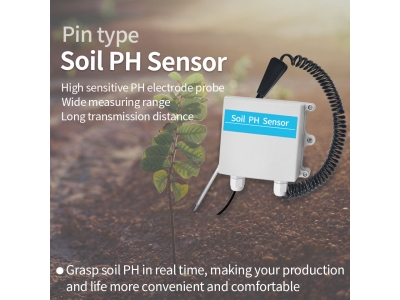Soil sensors play a crucial role in agriculture, environmental monitoring, and research. They provide valuable data about soil moisture, temperature, salinity, and other important parameters that directly impact plant growth and soil health. In this article, we will explore the key characteristics of soil sensors, including their accuracy, durability, ease of use, connectivity, and versatility.
Accuracy:
One of the most important characteristics of soil sensors is their accuracy in measuring soil properties. Accurate readings ensure that farmers, researchers, and environmentalists make informed decisions based on reliable data. High-quality soil sensors employ advanced technologies to minimize errors and provide precise measurements of soil moisture, temperature, and other parameters.
Durability:Soil sensors are often exposed to harsh environments, including extreme temperatures, moisture, and chemicals. Therefore, durability is a crucial characteristic. Good soil sensors are built to withstand these challenging conditions and have robust housing that protects them from damage. They are designed to have a long lifespan, ensuring reliable performance over an extended period.
Ease of Use:
User-friendliness is an essential characteristic of soil sensors, as they are utilized by a wide range of users, including farmers, researchers, and technicians. The sensors should be easy to install, operate, and maintain. Clear instructions and intuitive interfaces contribute to the user-friendly experience. Additionally, soil sensors that provide real-time data and automatic alerts simplify decision-making processes and improve efficiency.
Connectivity:
With the advancement of technology, connectivity has become an important characteristic of soil sensors. Wireless connectivity options, such as Wi-Fi, Bluetooth, or cellular networks, allow users to access real-time data remotely. This capability enables farmers to monitor soil conditions without physically visiting each location, saving time and resources. Moreover, connected sensors can contribute to data collection networks, facilitating large-scale analysis and research.
Versatility:
Different applications require different types of soil sensors. Versatility is an important characteristic as it allows users to measure multiple parameters using a single sensor or a combination of sensors. Some soil sensors can measure soil moisture, temperature, and salinity simultaneously, providing a comprehensive understanding of soil conditions. Versatile sensors enable users to customize their monitoring systems according to their specific needs.
Calibration and Maintenance:
To maintain accuracy, soil sensors require periodic calibration and maintenance. Good soil sensors have the capability to be calibrated easily, either manually or automatically, ensuring accurate measurements over time. Regular maintenance should be straightforward, including cleaning, battery replacement, and software updates. Sensors that offer self-diagnostic features can detect malfunctions and provide alerts for timely intervention.
Cost-effectiveness:
Cost-effectiveness is an important consideration, especially for farmers and organizations with limited budgets. The price of soil sensors should align with their quality, durability, and performance. High-quality sensors may have a higher upfront cost but can save money in the long run by providing accurate data that optimizes water usage, fertilizer application, and overall crop management.
In conclusion, soil sensors possess several key characteristics that make them valuable tools in agriculture and environmental monitoring. Accuracy, durability, ease of use, connectivity, versatility, calibration, and cost-effectiveness are all important factors to consider when selecting soil sensors. By choosing sensors with these characteristics, users can make informed decisions based on reliable data, leading to improved agricultural practices, better environmental management, and enhanced scientific research.





